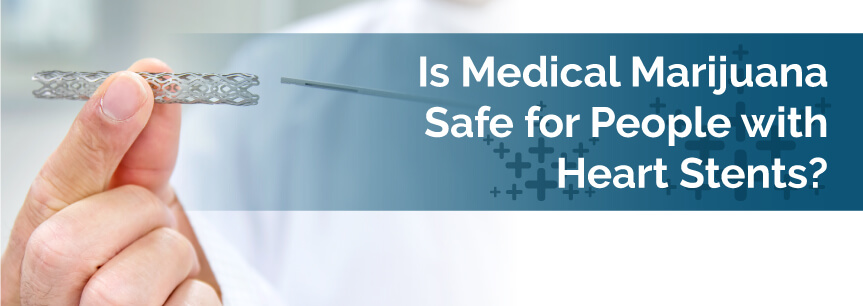
Medical marijuana has gained popularity for its potential to treat various health conditions, but for people with heart stents or cardiovascular disease, understanding the effects of cannabis on heart health is essential. Many wonder— is it safe for people with heart stents to use medical marijuana? While cannabis may provide relief for some symptoms of heart disease, patients must take precautions and seek medical advice to ensure it does not negatively affect their health.
Marijuana can have mixed effects on the heart, depending on the cannabinoids (such as THC and CBD) and the method of consumption. For heart patients, smoking marijuana is generally not recommended, as it introduces harmful toxins to the lungs and heart. Studies suggest that THC may increase heart rate and blood pressure, which could pose risks for individuals with cardiovascular conditions.
However, CBD has been researched for its potential heart health benefits. CBD may regulate heart rate, reduce inflammation, and even lower blood pressure in some cases. These effects make it a better option for heart patients, especially those with stents, who need to avoid strain on their cardiovascular system.
It’s important to consult with your doctor if you have a heart condition or stent, as they can guide you on safe cannabis consumption methods and dosages.
Medical marijuana can potentially alleviate several symptoms associated with heart disease:
It’s crucial to choose the right strain and consumption method, as using the wrong product can potentially exacerbate some heart-related symptoms.
If you’ve had a heart stent placed due to cardiovascular issues, managing your lifestyle carefully is critical to avoiding further complications. While medical marijuana can offer relief for symptoms such as pain, inflammation, and anxiety, it’s essential to be aware of certain factors that could negatively impact your health. People with heart stents must be cautious when using marijuana, particularly regarding the type of strain, method of consumption, and other lifestyle choices. Here’s a detailed look at what to avoid:
High-THC strains of marijuana can significantly affect the cardiovascular system. THC, or tetrahydrocannabinol, is the psychoactive compound in marijuana that creates the “high” sensation, but it also has physiological effects that can strain the heart. Some of the key reasons heart patients, particularly those with stents, should avoid THC-dominant strains include:
Recommendation: Instead of THC-dominant strains, consider strains with higher CBD (cannabidiol) content. CBD is a non-psychoactive compound that has shown promise in reducing heart-related risks. It does not increase heart rate or blood pressure, making it a safer alternative for heart patients. Always consult your healthcare provider before choosing a strain, as they can help tailor recommendations based on your specific heart condition.
Smoking marijuana is generally the most harmful method of consumption for heart patients, particularly those with a stent. Whether it’s marijuana or tobacco, inhaling combusted substances introduces a variety of harmful toxins into the body, which can directly harm the cardiovascular and respiratory systems. Here’s why smoking is especially risky for individuals with heart stents:
Recommendation: For heart patients, particularly those with a stent, it’s best to avoid smoking altogether. Instead, choose non-smoking methods of cannabis consumption such as edibles, tinctures, oils, or vaporization (without combustion). These methods reduce the risks associated with inhaling harmful substances and allow you to experience the therapeutic benefits of cannabis without endangering your heart.
Edibles are often recommended as a safer alternative to smoking for individuals with heart conditions. However, not all edibles are created equal—many commercially available edibles are packed with high amounts of sugar, artificial additives, and other unhealthy ingredients. This can pose additional risks for heart patients, especially those with a stent. Here’s why you should avoid edibles high in sugar:
Recommendation: When choosing edibles, look for those made with low-sugar or natural sweeteners. You can also explore cannabis-infused products like tinctures or capsules, which don’t contain sugar and offer a more controlled and safe way to manage your condition. Homemade edibles using healthier ingredients are also an option, allowing you to customize the dosage and avoid unhealthy additives.
For individuals with heart stents, taking extra precautions with marijuana use is crucial to avoid complications. Opt for high-CBD strains, avoid smoking, and be mindful of the type of edibles you consume. Always consult your healthcare provider to ensure you’re making safe choices that align with your heart health needs. If you’re considering medical marijuana as part of your wellness journey, Marijuana Doctors can help you get connected with a licensed doctor to discuss your options and guide you through the process of obtaining a medical marijuana card, ensuring that you have the resources and support needed to make informed decisions.
Yes, but it’s important to consult a healthcare provider first. CBD may be a better option for heart patients due to its calming effects and potential cardiovascular benefits. Avoid high-THC strains, which can increase heart rate and blood pressure.
CBD is generally considered safe for heart patients. Studies suggest it may help regulate heart rate, reduce blood pressure, and lower inflammation. However, always consult with your doctor before starting CBD, especially if you have a stent or other heart-related conditions.
Avoid smoking marijuana, as it introduces harmful toxins to the heart. High-THC strains should also be avoided, as they can increase heart rate and blood pressure. Stick to CBD-rich strains and consider non-smoking methods like edibles or tinctures.
Edibles are a safer alternative to smoking, but it’s essential to choose options with low sugar content and avoid high-THC products. Stick to CBD or balanced strains, and consult with your healthcare provider to ensure they align with your treatment plan.
Research on the link between marijuana and cardiovascular risks is still developing. While some studies suggest that high-THC marijuana can increase heart rate and blood pressure, CBD has shown promise for heart health benefits. Patients with heart conditions should always consult a doctor before using marijuana.
No Information on MarijuanaDoctors.Com should be used to diagnose, treat, prevent or cure any disease or condition. You can view our Full Disclaimer here.